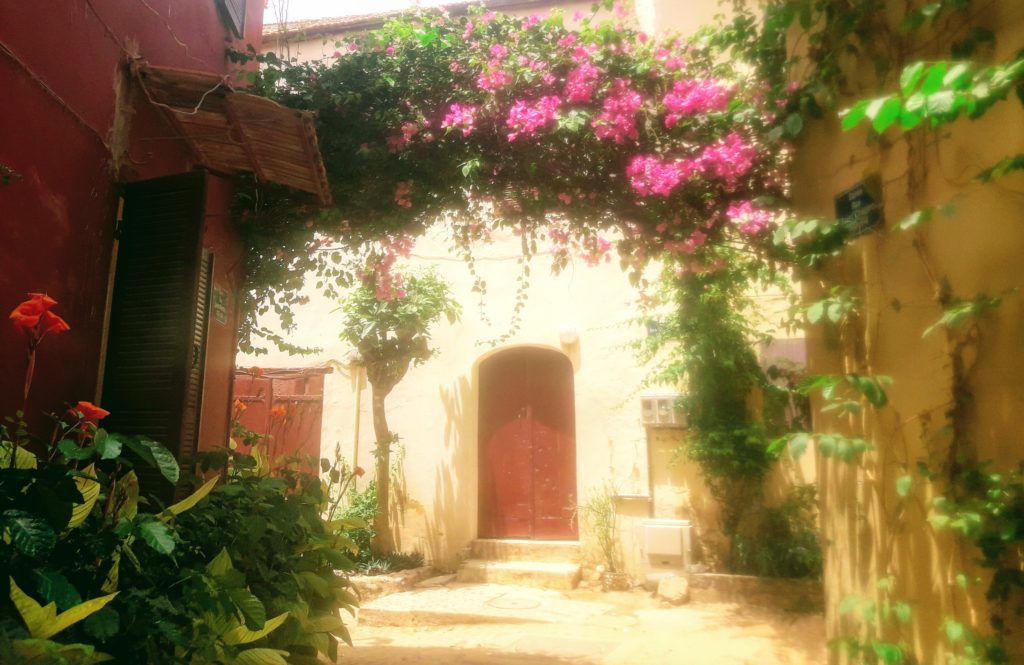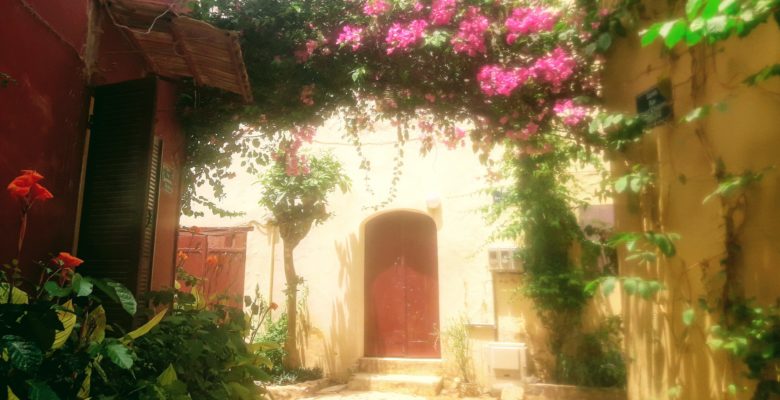
For those of you who’ve never logged on here before (Welcome 😎 ) I’m a conflict nerd, by which I mean a professional humanitarian peacebuilder. I’m sort of based in the UK, and have spent the last six years working in Central and West Africa, specialising in managing complex peacebuilding projects for international Non-Government Organisations (NGOs). After all, my name originates from Latin, meaning famous fighter, or renowned warrior. So no pressure…… 😆
A few months ago, I received an offer for a post I hadn’t actually applied for – and Shaka Boom – quickly found myself back in West Africa, more precisely in Senegal. I’ve done a number of aid missions in different countries – and stayed in some funky residences: rickety Catholic missions, houses with dodgy wiring, a villa with a swimming pool……This time I moved into an apartment in a courtyard of flowers and palm trees, lit up with fairy lights. This apartment was my temporary new home, just a few minutes from the edge of the ocean. I’d really landed on my feet.
When people – friends, extended family, or drunken acquaintances at parties, ask me “what’s it like, living in Africa?” I struggle to give them a brief answer. Africa is 54 countries (56 if you include the disputed territories of Somaliland and Western Sahara) with crazily different realities. I have lived in just 2 of these countries – the Central African Republic (CAR) and Mali – both sadly better known for conflicts than anything else (Mali does have the magical town of Timbuktu, and her equally enigmatic twin, Djenne, but I’m digressing……).
When I lived in CAR and went to Nairobi on holiday, I felt like I’d arrived in the United States. Kenya does tourists. CAR on the other hand has zero tourists (apart from a few intrepids who make it to the ravishing Dzanga-Sangha National Park to see Western Lowland gorillas and forest elephants, plus the elusive pangolin). My point is that “living in Africa” can mean wildly different experiences: I know just two different contexts, and little else – except Senegal: which brings me back to Dakar.
My new office was on a sandy street in the outskirts of Dakar. The team, expats and Senegalese, were friendly, wise, and quickly introduced me to Thiebou dieune, literally fish (thieb) and rice (dieune), the national plate, served with tamarind sauce. I liked the Senegalese, a lot: the Wolof word Teranga means hospitality, or welcoming generosity, and it suits these friendly, direct people. They made direct eye contact, said hello, and I was invited to meet families. When not munching fish and rice, visiting, or sat in front of my computer, I began to get my bearings: I was living near a small beach cum fishing village, called Ngor, with its own tiny island of the same name, where you could eat fried fish and chips in a friendly local resto, washed down with a cold Gazelle beer.
The rather larger isle of Gorée, lies 3 kms off the coast of Dhaka, a bewitching UNESCO World Heritage site of pastoral coloured colonial era buildings dripping in bougainvillea, seafront restaurants, and an artisan market where Senegalese women of charm half bully you into buying overpriced trinkets. There are two reasons to come to Gorée: first, the small community of artists who live in concrete bunkers at the top of the (only) hill, and sell brilliant metalwork handmade from recycled materials, plus beautiful handmade bags and screen-prints. The second reason is the Slave House Museum: as the UNESCO website puts it, “until the abolition of the (slave) trade in the French colonies, the island was a warehouse consisting of over a dozen slave houses…… Gorée was at the centre of the rivalry between European nations for control of the slave trade.” I confess that I didn’t go to the museum the first time I visited Gorée – having seen other slave-trade museums and archways of non-retour, I knew it would haunt me for weeks, and merited its own reflective visit. I was also put off by the mainly Senegalese tourists taking selfies at the entrance.
Gorée is just twenty minutes by ferry from mainland Dakar, and has light and clean air, fragrant gardens and small friendly eateries. Dakar has its own charms – the sea, international restaurants, wonderful bakeries, great music and superb dance clubs – alongside some of the worst air quality of any city in Africa. 70% of the cars in Senegal are in Dakar, hacking up stinky fumes from “Africa grade fuel” often sold by European companies dumping toxic products they can’t sell in European markets. The infamous Saharan Harmattan winds also blow in layers of dust and other pollutants, adding to the mix. There are few green spaces in Dakar, except the diplomatic quarter, far from our office. If you like cities buzzing with traffic and late night-life, this place is for you.
But I realised that it wasn’t so much about Dakar: I was really missing ‘the field’: Senegal is relatively stable, Dakar’s crime rate for instance is way below that of, say London. I’m used to working in more chaotic environments, and areas where there’s open conflict. I felt strangely restless in Dakar, unused to being so removed from what I was working on. After working in CAR, then Mali, I know that, for better or worse, I’m at my best when the environment around me is unpredictable and challenging.
I was invited to a strategic workshop in CAR, and flew out to the small capital, Bangui, delighted to be back in situ. We aid workers do a lot of strategic workshops, and ‘capacity building’ and empowering of women. Of course. When I arrived, Bangui was – well, she looked a bit tattier than last time I was here, but the security situation wasn’t too bad. One evening I met up with a young Central African woman called Emma who I had worked with when I lived in Bangui, back in 2013. She is eloquent, informed and opinionated, and still peacebuilding. CAR has been screwed over, then largely abandoned, by the so-called “international community”, yet it is not quite a failed state. Because of people like Emma.
After my week in Central Africa, I flew back to Senegal feeling strangely out of my body: for all its frustrations, long hours, nightmare logistics, and bloody awful Internet, I didn’t want to leave the field. I had a sinking realisation that working in a regional office probably wasn’t for me, which was a bloody shame because the team was great, it was an interesting job and there’s a lot to see in Senegal. As I was mulling this over, the week I got back to Dakar, a vicious headache and aching exhaustion suddenly floored me. Overnight I deteriorated, and instinctively knew I was in real danger: the headache was unbearable, my brain began to boil. I was lucky to be admitted to a good private clinic in Dakar, where a kind Lebanese doctor saved my life. “You have the worst kind of cerebral malaria possible” he said. “If you had arrived any later, you would have been in intensive care. Another two days, and you would have died.”
After five days and nights on a drip, I was discharged and came home to England to recover my strength. And yes, being this ill really clarified my need to make a decision. During those ten quiet days at home, I worked it out: I love peacebuilding because of its potential for change, and despite the risks (or if I’m honest, maybe because of them), I’m at my best working directly with communities, because I passionately believe in the power of community dialogue. I returned to Dakar, and quit my job. Just before leaving my post, I was invited back to Bangui, to deliver a training. I flew back there for another week (with a lot of Malaria meds) prophylaxis), spent a week in northern CAR with a great team, and knew I had made absolutely the right decision.
I’m now back in England, looking for a new field post, and feeling strangely uplifted by the whole experience: my employer has been very understanding, and it is so good to know what you want, and to have the freedom to pursue it. I have fully embraced my conflict nerd-ness, and am going back to the field very soon to try to live up to my #renowned-she-warrior origin: which is quite a challenge, but as you also say in Latin, “Fluctuat nec mergitur”……


thieb is rice and dienne is fish. Senegal is amazing and you need to just be aware of your surroundings by making sure you’re correctly dressed so you don’t get bit by mosquitoes. Also, why was it important to point out that the doctor was Lebanese?